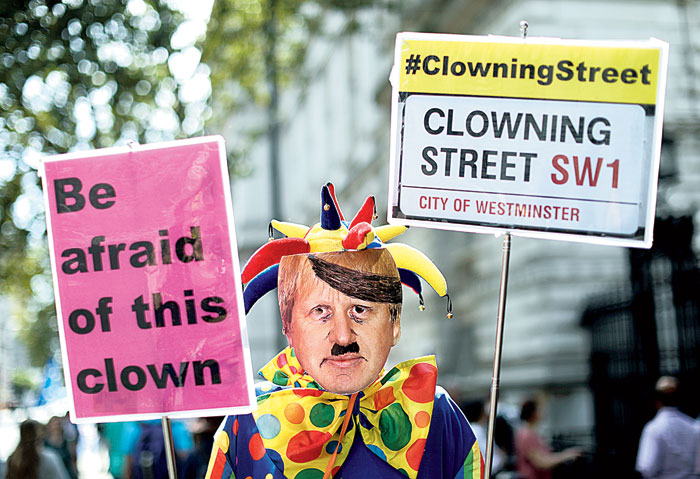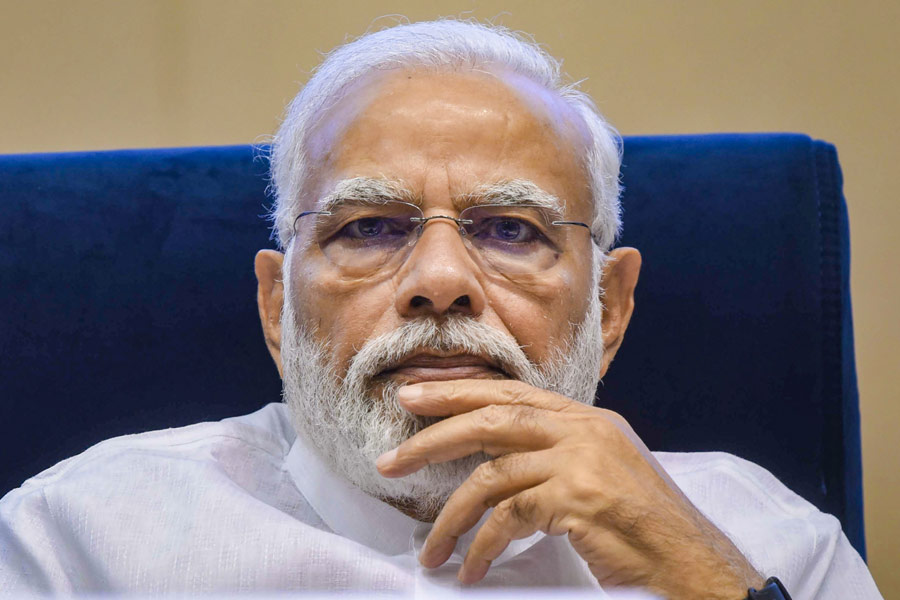The counter keeping track of the number of people who have signed a petition urging the Prime Minister not to suspend Parliament resembles the scoreboard when Ben Stokes is on the rampage — it is going up from one second to the next.
“Do not prorogue Parliament,” says the petition, which is meant to be discussed by the House if it crosses 100,000. By lunchtime on Thursday, barely 24 hours after it was started, it looked set to cross 1.5 million.
There have been demonstrations against a no-deal Brexit deal of the kind Boris wants to get through by October 31 outside the Commons and 10 Downing Street as well as in Manchester, Edinburgh, Cardiff, Birmingham, Liverpool, Bristol, Cambridge, Brighton, Durham, Milton Keynes, Chester and other places.
On Thursday, Boris saw his first two resignations. That of Lord Young of Cookham, a government whip in the upper house, who said he was “very unhappy” with the Prime Minister’s decision to prorogue Parliament for an extended period until October 14, will probably not matter very much.
But that of Ruth Davidson, as leader of the Conservative Party in Scotland, will be very damaging. It was under her leadership that the Tories in Scotland returned from the dead, won 13 seats in the 2017 general election and allowed Theresa May to form a government with the help of 10 MPs from Northern Ireland’s Democratic Unionist Party.
There was a pointed tweet from May, who said she was “sorry” to see Davidson stepping down as leader.
The former Prime Minister, who has not revealed what she thinks about the suspension of Parliament, tweeted: “Thank you for all you’ve done for our party and our Union over the last eight years…” A cross-party group of more than 70 MPs and peers branded Boris’s plans as an “assault on democracy” as it submitted a motion to the Court of Session in Edinburgh — the highest civil court in Scotland — asking for the move to be suspended.
Separately, the former Tory Prime Minister, Sir John Major, a respected Manmohan Singh type of figure, has revealed he is consulting lawyers with a view to challenging Boris in the courts.
Meanwhile, Labour and some Opposition parties have announced they will try to pass legislation in the Commons aimed at preventing Boris from implementing a no-deal Brexit when Parliament resumes briefly next week before it is prorogued.
But Boris was defended spiritedly by Jacob Rees-Mogg, the leader of the Commons, who flew to Scotland on Wednesday to seek the Queen’s agreement to the suspension of Parliament.
He hit back at the Commons speaker John Bercow who has described the decision to prorogue Parliament as “a constitutional outrage”.
“It is not constitutional for the Speaker to express his opinion without the direction of the House,” argued Rees-Mogg on BBC Radio 4’s Today programme.
“I think the outrage is phoney and it is created by people who don’t want us to leave the EU and are trying very hard to overturn the referendum result and don’t want the benefits of leaving the EU.”
This is not an opinion shared by many senior Tories, such as David Lidington, who was May’s de facto deputy Prime Minister: “I think if this had been done by a Labour government, never mind one led by Jeremy Corbyn, then Jacob Rees-Mogg would have been leading the denunciations of it and some of my Tory colleagues who are cheering at the moment would have been turning purple with rage.”
One of the big objections I have to this decision, which I do disagree with strongly, is it sets a very bad precedent for future governments. I think that it is not a good way to do democracy.”
The father of the Commons, Ken Clarke, agreed and said Boris “has just given in to the fanatic element of his followers and decided to go hell for leather. I hope it will bring together the sensible majority of Parliament who will find some alternative. I think Boris is absolutely outrageous ... (that) sort of petty dictator stuff will bring together the slightly divided majority in the House of Commons.”
Among newspapers, Boris received unquestioning backing from The Daily Telegraph, which summed up: “The real outrage is the antics of the Remainers.
“After three years of backsliding, compromise and humiliating defeat under Theresa May, the country has a Prime Minister who is evidently willing to do whatever it takes to carry out the people’s will.”
But others emphasised the “rogue” in “prorogue”, with the Guardian – it has also led the attack on Narendra Modi over Kashmir – described Boris’s action as “an act of wanton constitutional vandalism”.
The Financial Times took an even harder line, calling on MPs to table a no-confidence vote in order to trigger an election.
“It is time for parliamentarians to bring down his government in a no-confidence vote, paving the way for an election in which the people can express their will,” it said in its editorial.
But a taking a leaf out of Modi’s book, Boris is pressing on regardless.










